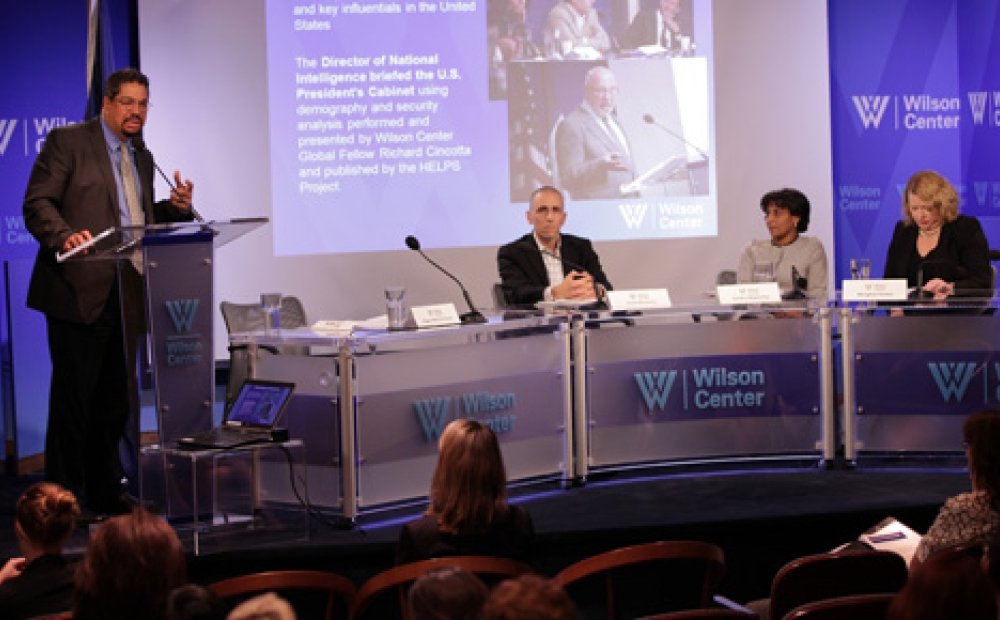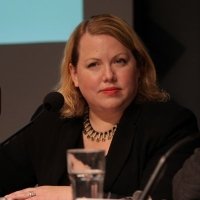The Right IDEA: Engaging Decisionmakers on Family Planning in the Post-2015 World

Just a few years ago, progress on global family planning and reproductive health policy seemed to be stuck in a rut. “For 20 years, development money for health had been directed to fight HIV and poverty, and as a result, momentum, interest, and funding for family planning had dwindled,” said Susan Rich, vice president of global partnerships for the Population Reference Bureau (PRB), at the Wilson Center on July 15. “Unmet need for family planning was high all over the world, but especially in Africa.”
But by 2015, the tide had turned. The U.S. Agency for International Development’s Ouagadougou Partnership, a major effort to expand access to voluntary family planning in West Africa, launched in 2011. The London Summit on Family Planning convened in 2012, launching a major financial commitment from the Bill and Melinda Gates Foundation, which co-hosted the 2013 International Conference on Family Planning in Addis Ababa, Ethiopia.
Beginning in 2010, USAID’s Informing Decision-makers to Act (IDEA) Project brought together three leading policy forums in Washington, DC – the Wilson Center, Population Reference Bureau, and Aspen Institute – to help lead the effort to reposition family planning and reproductive health by increasing knowledge, raising awareness, and spurring policy action among global leaders. “The goal of the project,” said Rich, “was to get the very best evidence about family planning into the hands of leaders and decision-makers and inspire them to invest in family planning policies and programs.”
Trusted Thought Leadership and Convening Power
“If you’re trying to reach these new audiences” – beyond ministers of health and development – “it really matters where you sit,” said Roger-Mark De Souza, director of population, environmental security, and resilience at the Wilson Center.
With the support of the IDEA Project, staff and scholars of the Wilson Center’s Environmental Change and Security Program (ECSP) have been thought leaders and trusted sources on the connections that link population and reproductive health to other key development and diplomatic issues, he said, including national security, the environment, gender, climate change, and food security.
For example, Wilson Center Global Fellow Richard Cincotta has pioneered important research in the field of political demography on the effects of age structure on state stability and democracy. Cincotta’s work predicting Tunisia’s revolution and democratic transition informed the Department of Defense, State Department, and Central Intelligence Agency, reaching the highest levels when the director of National Intelligence briefed the U.S. President’s Cabinet on his findings.
Using its convening power, the Wilson Center brought together policymakers from agencies that normally don’t work together for innovative events, like scenario exercises and all-day conferences looking “beyond the headlines” at population, environment, and security issues in the Sahel, Nigeria, Yemen, and Afghanistan. “It’s an opportunity to engage the leadership at the highest levels and really position what we are focusing on in a very central way,” said De Souza.
As the global focus on climate change grew, the Wilson Center helped policymakers understand the importance of incorporating population dynamics into climate policies, working with USAID’s Latin America and Africa Bureaus to organize in-country conferences on climate adaptation that raised awareness of the positive role that family planning can play in climate adaptation.
Local Engagement
It’s also important to help translate high-level policy discussions into on-the-ground change in key countries. PRB’s in-country capacity-building projects under IDEA included training local journalists to report on population trends and reproductive health; providing data and information to research fellows and government policymakers; and participating in regional and national political dialogues.
PRB's "ENGAGE" presentations target policymakers
“We don’t work just with policy communities and with institutions,” said Jason Bremner, PRB’s associate vice president and program director of population, health, and environment. “PRB’s approach to creating and enabling an environment for policy change is guided by a research-based, field-tested framework for transforming knowledge into action.”
For example, research on expanding midwife training by a PRB policy fellow in Ghana was cited by presidential candidate John Mahama during his 2012 campaign. The fellow’s recommendations were later implemented by President Mahama when Ghana received funds from the European Union to address maternal mortality.
“Increasingly, the flashpoint is at a lower and lower level for decision-making,” said Bremner. “We really need to connect global advocates and global tools to those on the front line at the state, district, and county level.”
A New Media Landscape
To reach new audiences, IDEA partners employed innovative communications strategies that evolved considerably during the project’s five-year span. In 2010, Facebook was not yet publicly traded and Twitter had less than 30 million active users; they “were still considered distracting toys by some people,” said Meaghan Parker, senior writer/editor for ECSP at the Wilson Center. “Today they are dominant platforms with market caps in billions of dollars and every single policymaker from the president to the pope is online.”
The Wilson Center leveraged these new platforms and relationships with traditional media to significantly grow the audience for New Security Beat, ECSP’s blog. As one of the only forums for original analysis on population, environment, and security connections, more than 70 percent of respondents in a recent survey cited ECSP as their single “go-to” source on these issues, said Parker.
One of the Wilson Center’s priorities under the IDEA Project was to communicate the power of population, health, and environment (PHE) development projects. To share this innovative approach with busy policymakers, donors, and practitioners, the Wilson Center conceived its “Healthy People, Healthy Environment” series of mini-documentaries. Shot in Tanzania, Nepal, and Ethiopia, these films allow remote communities to speak in their own words to audiences around the globe about how this unique approach to development meets their needs.
ECSP's third film on population, health, and environment (PHE) explores a project in Ethiopia
Efforts to engage with a broader audience helped foster relationships with other storytellers. After being impressed by a Wilson Center panel on PHE at the World Conservation Congress in 2008, Pulitzer Prize-winning journalist Kenneth Weiss of the Los Angeles Times produced a multi-part, multimedia series, Beyond 7 Billion, highlighting innovative PHE projects in Africa and Asia. In addition to winning a Robert F. Kennedy Journalism Award for human rights reporting, it inspired a series of influential op-eds in the Los Angeles Times in support of family planning funding and policies.
Similarly, in Malawi, “the media has played a tremendous role in changing public opinion of the otherwise sensitive nature of family planning messages to communities,” said Sandra Mapemba, PRB’s Malawi country coordinator.
PRB support helped community radio stations report on family planning by hosting live public debates and exposing the lack of services. Some radio stations also conducted community outreach to find new ways to spread information about family planning, said Mapemba, including through environmental activities, initiating youth-friendly health services, organizing income generating activities, and mobilizing women’s groups.
It’s not just reporters who are important audiences, but also their editors, said Mapemba. Editors are the gatekeepers that decide which stories are pursued and published, so PRB also sought to increase their knowledge and support for stories about maternal health and family planning.
The Post-2015 World
The efforts of the IDEA Project and others like it have contributed to growing support for international reproductive health and family planning funding and policies. As the Millennium Development Goals wind down and people take stock of where family planning targets fell short, the focus has shifted to ways to reach the most remote or marginalized people.
At the 2012 London Summit on Family Planning, more than 20 governments made commitments to improve access to family planning services, creating the Family Planning 2020 (FP2020) global partnership that pledges to provide contraceptive access to 120 million more women in developing countries by 2020.
“You can’t move this forward again without having rights and empowerment be central”
As they enter the implementation phase, FP2020 hopes to focus on reproductive rights and women’s empowerment, said Beth Schlachter, executive director of FP2020. “It was really through some of the people in this room that FP2020 includes a rights and empowerment group; it wasn’t part of that original framework,” she said. “It was through the advocacy and push from a lot of people to say, ‘You can’t move this forward again without having rights and empowerment be central to your discussions.’”
For example, one group that is underserved is very young married girls (ages 10 to 14). “I know there are ethical considerations about gathering data around those girls,” said Schlachter, “but if we’re talking about equity and the hardest to reach that is one community…that through our data and measurement agenda we need to do more to see what we can extrapolate.”
The overall embrace of FP2020 is a sign of the progress that’s been made in getting these issues back on the map, Schlachter said.
“While IDEA was implemented, the global landscape for family planning continued to change,” said PRB’s Susan Rich. “As we look ahead to the post-2015 world, attaining the FP2020 commitments, and Sustainable Development Goals, we are eager to share lessons learned for effective advocacy at the country level so we can inspire others to work effectively for the change we all hope to see: a world with universal access to family planning.”
“We have to continue to think about how we engage new audiences and add a greater impact to the development community,” said De Souza. “We are bringing family planning and reproductive health to the core of these discussions.”
Event Resources:
Drafted by Carley Chavara, edited by Schuyler Null
Speakers

Vice President, Sustainable Markets, Pact

Executive Director, Council for the Advancement of Science Writing
Hosted By

Environmental Change and Security Program
The Environmental Change and Security Program (ECSP) explores the connections between environmental change, health, and population dynamics and their links to conflict, human insecurity, and foreign policy. Read more
